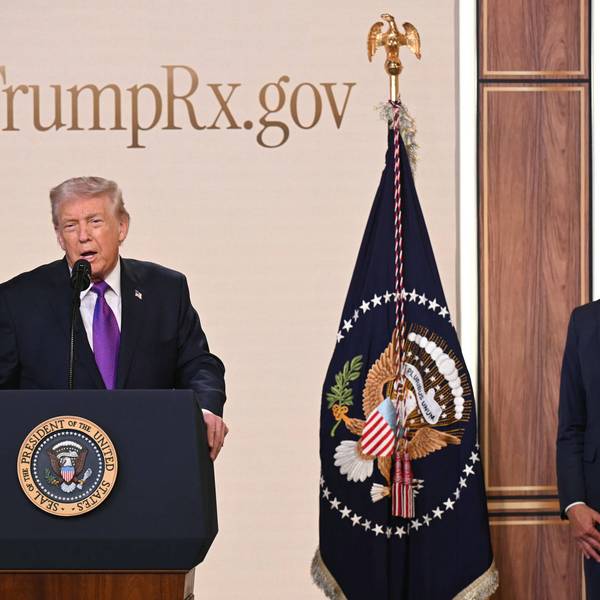
A screenshot shows an ad paid for by Seniors 4 Better Care, a front group for the American Prosperity Alliance.
Report Exposes Big Pharma Front Groups Posing as Patient Advocates
"When your board is stacked with industry insiders, your primary funding comes from pharma, and your talking points mirror those of drug lobbyists, you're not a patient advocacy organization—you're a PR operation."
A report published Monday reveals that a number of organizations claiming to represent the interests of patients are actually pharmaceutical industry front groups working against efforts to bring down drug costs in the United States, including by lobbying the Trump administration to scale back Medicare price negotiations.
The new analysis by Patients for Affordable Drugs Now (P4AD), which stressed that it doesn't take money from organizations that profit from the production or distribution of prescription medications, spotlights six groups: the Alliance for Aging Research, the American Action Forum, the Center for Medicine in the Public Interest, the Council for Affordable Health Coverage, the Pacific Research Institute, and Seniors 4 Better Care.
The featured organizations, according to P4AD, "are posing as independent patient or policy groups while acting as mouthpieces for the drug industry's agenda—all while raking in pharma cash, fighting Medicare negotiation, and pushing misleading claims to block reforms."
Seniors 4 Better Care, for instance, is a shell group of the American Prosperity Alliance, the president of which "has a history of lobbying for the healthcare industry, including for organizations at the Healthcare Association of New York and insurance providers such as MVP Healthcare," P4AD's report observes.
"The group's treasurer, Parker Hamilton Poling, is a former lobbyist for pharmaceutical companies like Roche and Cencora," the report notes. "Brian Berry, the organization's secretary, also has a history of lobbying for Chinese biotech companies like Complete Genomics."
Earlier this year, Seniors 4 Better Care bankrolled an ad that directly urged President Donald Trump to end the "pill penalty," a label the pharmaceutical industry has used to describe the treatment of small-molecule prescription drugs under the Inflation Reduction Act's Medicare price negotiation provisions.
Last month, in a major gift to Big Pharma and industry lobbyists, Trump signed an executive order aimed at delaying Medicare negotiations for small-molecule drugs, which represent 90% of prescription medicines currently in circulation.
Another group highlighted in P4AD's report is the Center for Medicine in the Public Interest (CMPI), which describes itself as "a nonprofit, nonpartisan research and educational organization that seeks to advance the discussion and development of patient-centered healthcare."
P4AD notes that "every single member" of the organization's board has ties to the pharmaceutical industry. Peter Pitts, CMPI's president and co-founder, "primarily worked at firms hired by the pharmaceutical industry following an 18-month stint at the Food and Drug Administration," P4AD's report states.
"While working at major firms, such as Porter Novelli, Pitts retained his role at CMPI and insisted it was not a conflict of interest," the report continues. "He also currently teaches at the University of Paris, Descartes School of Medicine, a department that is funded by AstraZeneca."
Merith Basey, P4AD's executive director, said that "when your board is stacked with industry insiders, your primary funding comes from pharma, and your talking points mirror those of drug lobbyists, you're not a patient advocacy organization—you're a PR operation."
"Polling shows that Americans are aware that pharmaceutical corporations are the primary drivers of high drug prices, which is why the industry funds front groups to mislead the public and protect its bottom line," said Basey. "Patients and policymakers deserve to know whose interests these groups truly represent."
An Urgent Message From Our Co-Founder
Dear Common Dreams reader, The U.S. is on a fast track to authoritarianism like nothing I've ever seen. Meanwhile, corporate news outlets are utterly capitulating to Trump, twisting their coverage to avoid drawing his ire while lining up to stuff cash in his pockets. That's why I believe that Common Dreams is doing the best and most consequential reporting that we've ever done. Our small but mighty team is a progressive reporting powerhouse, covering the news every day that the corporate media never will. Our mission has always been simple: To inform. To inspire. And to ignite change for the common good. Now here's the key piece that I want all our readers to understand: None of this would be possible without your financial support. That's not just some fundraising cliche. It's the absolute and literal truth. We don't accept corporate advertising and never will. We don't have a paywall because we don't think people should be blocked from critical news based on their ability to pay. Everything we do is funded by the donations of readers like you. Will you donate now to help power the nonprofit, independent reporting of Common Dreams? Thank you for being a vital member of our community. Together, we can keep independent journalism alive when it’s needed most. - Craig Brown, Co-founder |
A report published Monday reveals that a number of organizations claiming to represent the interests of patients are actually pharmaceutical industry front groups working against efforts to bring down drug costs in the United States, including by lobbying the Trump administration to scale back Medicare price negotiations.
The new analysis by Patients for Affordable Drugs Now (P4AD), which stressed that it doesn't take money from organizations that profit from the production or distribution of prescription medications, spotlights six groups: the Alliance for Aging Research, the American Action Forum, the Center for Medicine in the Public Interest, the Council for Affordable Health Coverage, the Pacific Research Institute, and Seniors 4 Better Care.
The featured organizations, according to P4AD, "are posing as independent patient or policy groups while acting as mouthpieces for the drug industry's agenda—all while raking in pharma cash, fighting Medicare negotiation, and pushing misleading claims to block reforms."
Seniors 4 Better Care, for instance, is a shell group of the American Prosperity Alliance, the president of which "has a history of lobbying for the healthcare industry, including for organizations at the Healthcare Association of New York and insurance providers such as MVP Healthcare," P4AD's report observes.
"The group's treasurer, Parker Hamilton Poling, is a former lobbyist for pharmaceutical companies like Roche and Cencora," the report notes. "Brian Berry, the organization's secretary, also has a history of lobbying for Chinese biotech companies like Complete Genomics."
Earlier this year, Seniors 4 Better Care bankrolled an ad that directly urged President Donald Trump to end the "pill penalty," a label the pharmaceutical industry has used to describe the treatment of small-molecule prescription drugs under the Inflation Reduction Act's Medicare price negotiation provisions.
Last month, in a major gift to Big Pharma and industry lobbyists, Trump signed an executive order aimed at delaying Medicare negotiations for small-molecule drugs, which represent 90% of prescription medicines currently in circulation.
Another group highlighted in P4AD's report is the Center for Medicine in the Public Interest (CMPI), which describes itself as "a nonprofit, nonpartisan research and educational organization that seeks to advance the discussion and development of patient-centered healthcare."
P4AD notes that "every single member" of the organization's board has ties to the pharmaceutical industry. Peter Pitts, CMPI's president and co-founder, "primarily worked at firms hired by the pharmaceutical industry following an 18-month stint at the Food and Drug Administration," P4AD's report states.
"While working at major firms, such as Porter Novelli, Pitts retained his role at CMPI and insisted it was not a conflict of interest," the report continues. "He also currently teaches at the University of Paris, Descartes School of Medicine, a department that is funded by AstraZeneca."
Merith Basey, P4AD's executive director, said that "when your board is stacked with industry insiders, your primary funding comes from pharma, and your talking points mirror those of drug lobbyists, you're not a patient advocacy organization—you're a PR operation."
"Polling shows that Americans are aware that pharmaceutical corporations are the primary drivers of high drug prices, which is why the industry funds front groups to mislead the public and protect its bottom line," said Basey. "Patients and policymakers deserve to know whose interests these groups truly represent."
A report published Monday reveals that a number of organizations claiming to represent the interests of patients are actually pharmaceutical industry front groups working against efforts to bring down drug costs in the United States, including by lobbying the Trump administration to scale back Medicare price negotiations.
The new analysis by Patients for Affordable Drugs Now (P4AD), which stressed that it doesn't take money from organizations that profit from the production or distribution of prescription medications, spotlights six groups: the Alliance for Aging Research, the American Action Forum, the Center for Medicine in the Public Interest, the Council for Affordable Health Coverage, the Pacific Research Institute, and Seniors 4 Better Care.
The featured organizations, according to P4AD, "are posing as independent patient or policy groups while acting as mouthpieces for the drug industry's agenda—all while raking in pharma cash, fighting Medicare negotiation, and pushing misleading claims to block reforms."
Seniors 4 Better Care, for instance, is a shell group of the American Prosperity Alliance, the president of which "has a history of lobbying for the healthcare industry, including for organizations at the Healthcare Association of New York and insurance providers such as MVP Healthcare," P4AD's report observes.
"The group's treasurer, Parker Hamilton Poling, is a former lobbyist for pharmaceutical companies like Roche and Cencora," the report notes. "Brian Berry, the organization's secretary, also has a history of lobbying for Chinese biotech companies like Complete Genomics."
Earlier this year, Seniors 4 Better Care bankrolled an ad that directly urged President Donald Trump to end the "pill penalty," a label the pharmaceutical industry has used to describe the treatment of small-molecule prescription drugs under the Inflation Reduction Act's Medicare price negotiation provisions.
Last month, in a major gift to Big Pharma and industry lobbyists, Trump signed an executive order aimed at delaying Medicare negotiations for small-molecule drugs, which represent 90% of prescription medicines currently in circulation.
Another group highlighted in P4AD's report is the Center for Medicine in the Public Interest (CMPI), which describes itself as "a nonprofit, nonpartisan research and educational organization that seeks to advance the discussion and development of patient-centered healthcare."
P4AD notes that "every single member" of the organization's board has ties to the pharmaceutical industry. Peter Pitts, CMPI's president and co-founder, "primarily worked at firms hired by the pharmaceutical industry following an 18-month stint at the Food and Drug Administration," P4AD's report states.
"While working at major firms, such as Porter Novelli, Pitts retained his role at CMPI and insisted it was not a conflict of interest," the report continues. "He also currently teaches at the University of Paris, Descartes School of Medicine, a department that is funded by AstraZeneca."
Merith Basey, P4AD's executive director, said that "when your board is stacked with industry insiders, your primary funding comes from pharma, and your talking points mirror those of drug lobbyists, you're not a patient advocacy organization—you're a PR operation."
"Polling shows that Americans are aware that pharmaceutical corporations are the primary drivers of high drug prices, which is why the industry funds front groups to mislead the public and protect its bottom line," said Basey. "Patients and policymakers deserve to know whose interests these groups truly represent."

